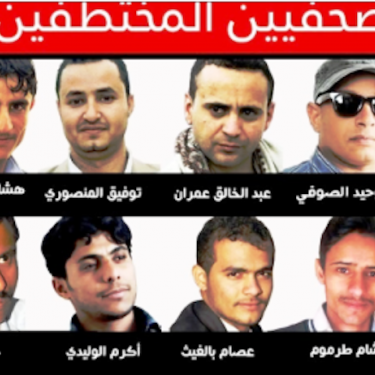Ten journalists held by Houthi rebels are on hunger strike

Reporters Without Borders (RSF) is concerned about the plight of journalists held by armed groups in Yemen, especially Houthi rebels and Al-Qaeda in the Arabian Peninsula (AQAP), and calls for their release. RSF also reminds all parties to the conflict that they have a duty to protect journalists.
In a joint statement, the families of journalists held by Houthi rebels in the capital, Sanaa, reported that the journalists began a hunger strike on 9 May in protest against the conditions in which they are being held. The families also called for the release of the journalists, most of whom have been held for more than a year.
According to RSF’s tally, a total of 14 journalists and citizen-journalists are currently being held by armed groups in Yemen.
“We are very concerned about the detention of journalists in Yemen and we appeal to their abductors to release them unconditionally,” said Alexandra El Khazen, the head of RSF’s Middle East desk. “We remind all parties to the conflict that they are required by international law to protect media personnel, like other civilians.”
In their joint statement, the families condemned the constant mistreatment of the journalists (including torture and denial of adequate medical care) and the recent bans on visits in Habra prison. The branch of the Yemeni Journalists’ Syndicate in the southern city of Aden said it supports the call for their release and blames the Houthis.
The journalists on hunger strike are Toufic Al Mansouri, Hassan Enab, Akram Al Walidi, Issam Belghith, Hareth Hamid, Haytham Al Shehab, Hicham Al Youssefi, Hicham Tarmoum, Abdel Khalaq Amrane and Salah Al Qa’idi.
According to the Yemeni media, the Yemeni government delegation yesterday called for their release (and the release of other detainees) at the peace talks that began under UN aegis in Kuwait on 21 April.
Journalists are in permanent danger in Yemen as a result of the continuing political instability and security threats. Few professional journalists are still working in Sanaa, which the Houthi rebels have controlled since September 2014.
The threats to reporters and media outlets come from all parties to the conflict. As well as coming under fire or being the victims or air strikes, they are also liable to be arrested arbitrarily or abducted, and their offices are often raided and attacked.
In one recent case, the premises of the Al-Shumo Foundation and its affiliate newspaper, Akhbar Al-Youm, in Aden were attacked and looted by southern forces on 8 May. Their headquarters were already attacked by Houthi rebels in February 2015.
Yemen is ranked 170th out of 180 countries in RSF’s 2016 World Press FreedomIndex.



